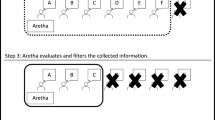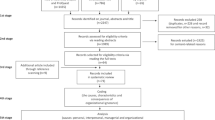Abstract
In the current debate there are two epistemological approaches to the definition of ignorance: the Standard View and the New View. The former defines ignorance simply as not knowing, while the latter defines it as the absence of true belief. One of the main differences between these two positions lies in rejecting (Standard View) or in accepting (New View) the factivity of ignorance, i.e., if an agent is ignorant of \(\phi \), then \(\phi \) is true. In the present article, we first provide a criticism of the Standard View in favour of the New View. Secondly, we propose a formal setting to represent the notion of factive ignorance.

Similar content being viewed by others
Notes
We borrow this terminology from Le Morvan and Peels (2016).
The difference between the nature of knowledge and belief is acknowledged by many authors, see e.g., Williamson (2000).
To be precise, ELI does not correspond to an epistemic logic, simply because the central notion involved is not the one of epistémě. Since the theory of ignorance is called agnoiology (from the Greek ágnoia) by Ferrier (1856), the logic we are going to introduce would be better characterized as an agnotic logic. However, here we stick to the standard terminology.
In terms of I this would be \(I(\phi \rightarrow \psi ) \rightarrow (I\phi \rightarrow I\psi )\).
For more details on this method, see van Ditmarsch et al. (2008, chapter 8).
References
Beaver, D. I., & Geurts, B. (2011). Presupposition. The Stanford Encyclopedia of Philosophy (winter edition 2014), Edward N. Zalta (ed.), http://plato.stanford.edu/archives/win2014/entries/presupposition/.
van Ditmarsch, H., van der Hoek, W., Kooi, B. (2008). Dynamic epistemic logic. Springer, Synthese library.
Driver, J. (1989). The virtues of ignorance. The Journal of Philosophy, 86(7), 373–384.
Ferrier, J. F. (1856). Institutes of Metaphysic: The Theory of Knowing and Being. Reprinted in edited form in James Frederick Ferrier: Selected Writings, ed. Jennifer Keefe (Charlottesville, VA: Imprint Academic, 2011), 157.
Fields, H. (1994). Moral beliefs and blameworthiness. Philosophy, 69(4), 397–415.
Gettier, E. L. (1963). Is justified true belief knowledge? Analysis, 23, 121–123.
Gilbert, D. R., & Venturi, G. (2016). Reflexive insensitive modal logics. Review of Symbolic Logic, 9(1), 167–180.
Goldman, A. I. (1986). Epistemology and cognition. Cambridge, MA: Harvard University Press.
Goldman, A. I., & Olsson, E. J. (2009). Reliabilism and the value of knowledge. In A. Haddock, A. Millar, & D. Pritchard (Eds.), Epistemic value (pp. 19–41). Oxford: Oxford University Press.
Guerrero, A. A. (2007). Don’t know, don’t kill: Moral ignorance, culpability, and caution. Philosophical Studies, 136(1), 59–97.
Hintikka, J. (1961). Modality and quantification. Theoria, 27, 119–128.
Hintikka, J. (1962). Knowledge and belief: An introduction to the logic of the two notions. Ithaca: Cornell University Press.
Hintikka, J. (1963). The modes of modality. Acta Philosophica Fennica, 16, 65–82.
van der Hoek, W., & Lomuscio, A. (2004). A logic for ignorance. Electronic Notes in Theoretical Computer Science, 85(2), 117–133.
Humberstone, L. (2013). Zolin and Pizzi: Defining necessity from noncontigency. Erkenntnis, 78(6), 1275–1302.
Kiparsky, P., & Kiparsky, C. (1970). Fact. In M. Bierwisch & K. Heidolph (Eds.), Progress in linguistics (pp. 143–173). The Hague: Mouton.
Langendoen, D. T., & Savin, H. B. (1971). The projection problem for propositions. In C. Fillmore & D. T. Langendoen (Eds.), Studies in linguistic semantics (pp. 54–60). New York: Holt, Reinhardt and Winston.
Le Morvan, P. (2011). On ignorance: A reply to peels. Philosophia, 39(2), 335–344.
Le Morvan, P. (2012). On ignorance: A vindication of the standard view. Philosophia, 40(2), 379–393.
Le Morvan, P. (2013). Why the standard conception of ignorance prevails. Philosophia, 41(1), 239–256.
Le Morvan, P., & Peels, R. (2016). The nature of ignorance: Two views. In R. Peels & M. Blaauw (Eds.), The epistemic dimensions of ignorance (pp. 12–32). Cambridge: Cambridge University Press.
Lewis, D. (1986). On the plurality of worlds. Oxford: Blackwell.
Peels, R. (2010). What is ignorance? Philosophia, 38(1), 57–67.
Peels, R. (2011). Ignorance is lack of true belief: A rejoinder to Le Morvan. Philosophia, 39(2), 344–355.
Peels, R. (2012). The new view on ignorance undefeated. Philosophia, 40(4), 741–750.
Steinsvold, C. (2008). A note on logics of ignorance and borders. Notre Dame Journal of Formal Logic, 49(4), 385–392.
van Woudenberg, R. (2009). Ignorance and force: Two excusing conditions for false beliefs. American Philosophical Quarterly, 46(4), 373–86.
Williamson, T. (2000). Knowledge and its limits. Oxford: Oxford University Press.
Zimmerman, M. J. (1988). An essay on moral responsibility. Totowa, NJ: Rowman and Littlefield.
Acknowledgements
The authors would like to thank the anonymous referees of Synthese, Paul Égré, David Gilbert and Giorgio Venturi for useful comments on the material of this paper. The authors gratefully acknowledge the support of São Paulo Research Foundation (FAPESP) through the Project Auxílio à Pesquisa—Jovem Pesquisador No. 2016/25891-3. The work of Ekaterina Kubyshkina is supported by the São Paulo Research Foundation (FAPESP), Grant 2018/25501-6. The work of Mattia Petrolo is partly supported by National Council for Scientific and Technological Development (CNPq) through the project Universal/Faixa A, No. 433781/2018-1.
Author information
Authors and Affiliations
Corresponding author
Additional information
Publisher's Note
Springer Nature remains neutral with regard to jurisdictional claims in published maps and institutional affiliations.
Rights and permissions
About this article
Cite this article
Kubyshkina, E., Petrolo, M. A logic for factive ignorance. Synthese 198, 5917–5928 (2021). https://doi.org/10.1007/s11229-019-02440-1
Received:
Accepted:
Published:
Issue Date:
DOI: https://doi.org/10.1007/s11229-019-02440-1




